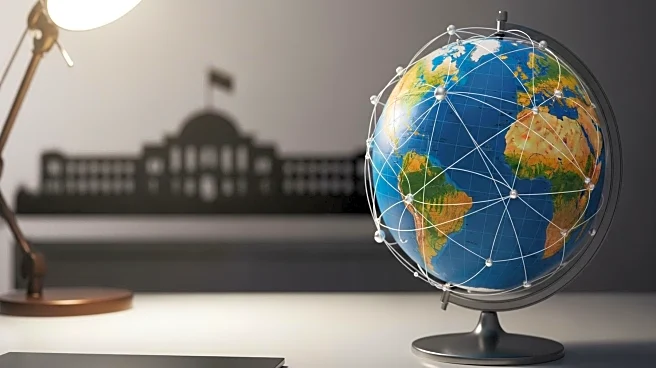What's Happening?
External Affairs Minister S Jaishankar emphasized the necessity of a global workforce in today's changing world, highlighting that many countries cannot meet workforce demands due to demographic limitations. His remarks were made during an event hosted by the Observer Research Foundation on the sidelines of the U.N. General Assembly. Jaishankar's comments come in the context of President Trump's recent imposition of a $100,000 fee on H-1B visas, which predominantly affects Indian professionals. He advocated for a more efficient model of a global workforce distributed across a global workplace, acknowledging the political debates surrounding the location of such a workforce. Jaishankar also noted the evolving nature of trade arrangements and the importance of building national capacities to achieve multi-polarity.
Why It's Important?
The discussion on global workforce dynamics is crucial as it addresses the challenges posed by demographic constraints and immigration policies, such as President Trump's H-1B visa fee. This fee impacts Indian professionals significantly, potentially affecting U.S.-India relations and the tech industry, which relies heavily on skilled foreign workers. Jaishankar's call for a distributed global workforce model highlights the need for international cooperation in workforce management, which could lead to new trade partnerships and economic strategies. The emphasis on building national capacities reflects a shift towards self-reliance, which could influence global economic policies and trade practices.
What's Next?
The ongoing debate over immigration policies and workforce distribution is likely to continue, with potential implications for international trade and economic relations. Countries may explore new trade arrangements and partnerships to adapt to changing workforce demands. The focus on building national capacities could lead to increased investment in domestic industries and infrastructure, potentially reshaping global economic landscapes. Stakeholders, including political leaders and businesses, will need to navigate these changes to ensure economic stability and growth.
Beyond the Headlines
The broader implications of Jaishankar's remarks and President Trump's visa policies include ethical considerations regarding immigration and workforce distribution. The push for a global workforce model raises questions about equitable access to employment opportunities and the impact of political decisions on individual livelihoods. Additionally, the emphasis on self-reliance and national capacity building may lead to cultural shifts in how countries approach globalization and international cooperation.









